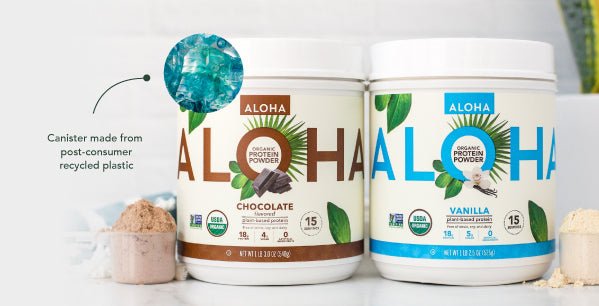
Recycled plastics are the materials that have been used, processed and reused to create new products. In 2021 we took a big step in our sustainability commitment by changing our protein powder canisters, previously made of virgin steel, to post-consumer recycled material. Our goal was to pull plastic out of the waste stream and give it a second life.
Using PCR (post-consumer recycled) packaging is a great way to reduce waste, save energy and resources, and help protect the environment. Post-consumer recycling refers to the process of collecting and reusing plastic materials that have already been used by consumers. This can include items such as water bottles, food containers, plastic bags and packaging materials. These recycled plastics can be used in a variety of applications ranging from construction to manufacturing to consumer products such as our protein powders. Through post-consumer recycling of plastics, we can help reduce our environmental impact while still enjoying the benefits of plastic products!
Universally Recyclable

The ease and accessibility to recycling services is strongly correlated with high recycling rates. Although steel is highly recyclable, we heard from many customers who did not know how or where to recycle steel. The PCR plastics used for our protein powder canisters is HDPE (recycling symbol #2), and can be recycled at virtually every recycling facility in the United States. Recycled plastics are becoming increasingly popular in the world today versus other materials due to their universal recyclability.
Less Waste

High-density polyethylene (HDPE) is a versatile, durable plastic that is widely used for packaging and other applications. It's an important material for recycling, as it can be easily recycled into new products. HDPE is made from recycled plastics, which helps to reduce the amount of waste going to landfills and reduces the need for additional resources in production. This makes HDPE an environmentally friendly choice for many products and applications.
HDPE is also one of the best materials when it comes to shipping. Other materials are more prone to become damaged or broken, which creates food and packaging waste. Changing our protein powder canisters allowed us to significantly decrease the amount of protein powder that was damaged during shipping.
Fewer Emissions

Our updated canisters are also much lighter. Lightening the load means less fuel is used to transport our protein powders. Although we participate in 100% carbon offsets for our ALOHA.com shipments, we are always conscious of working towards less total fuel usage.
Lightweight packaging materials such as cardboard, paper, and recycled plastics are becoming increasingly popular in the packaging industry due to their light weight and cost effectiveness. Additionally, these materials are easier to recycle than heavier options such as glass or metal. This makes them a great option for businesses looking to reduce their environmental impact while still providing quality products to customers.
We as a team are constantly evaluating packaging options to generate the lowest amount of environmental impact, while preserving our best-in-class food safety standards. A key responsibility of good packaging is its ability to keep out light and moisture -- keeping our food fresh and our bodies healthy!
As a certified B Corporation, ALOHA has a commitment to sustainability, and we will continue to work on all aspects of our supply chain. We are proud to use USDA Organic, Non GMO, and Fair Trade Certified ingredients.









